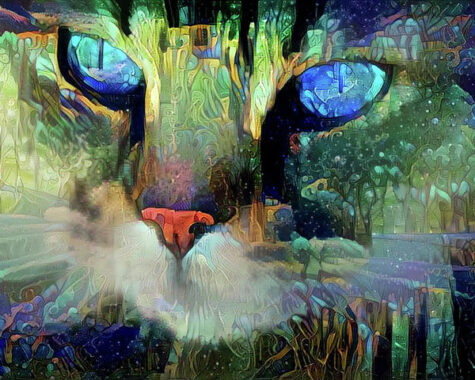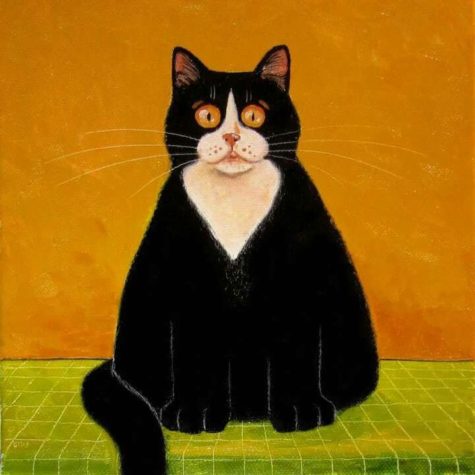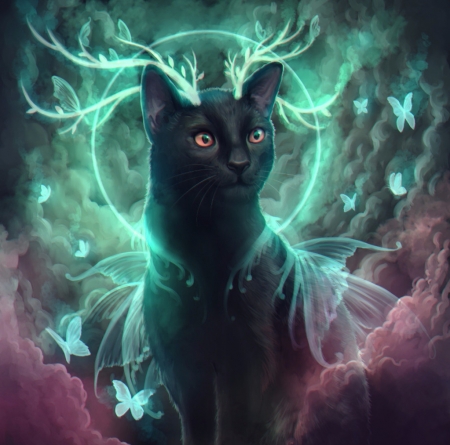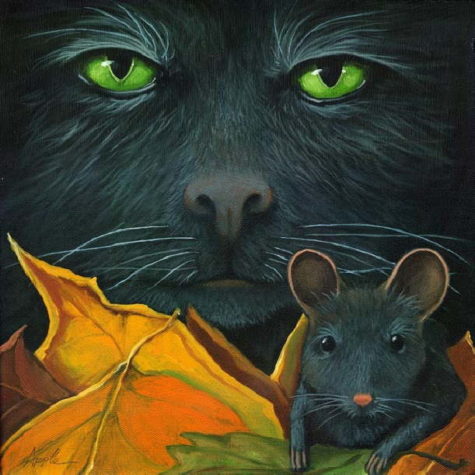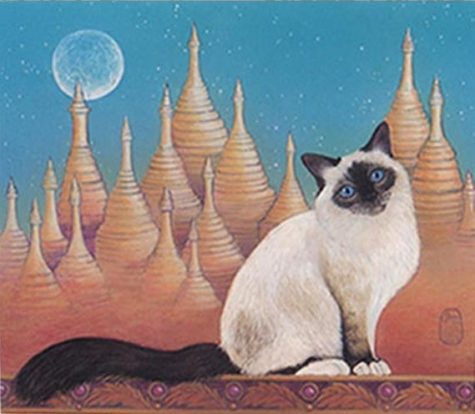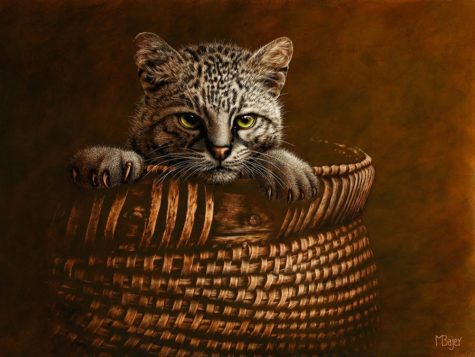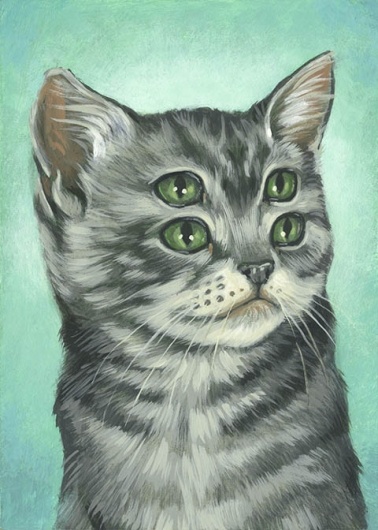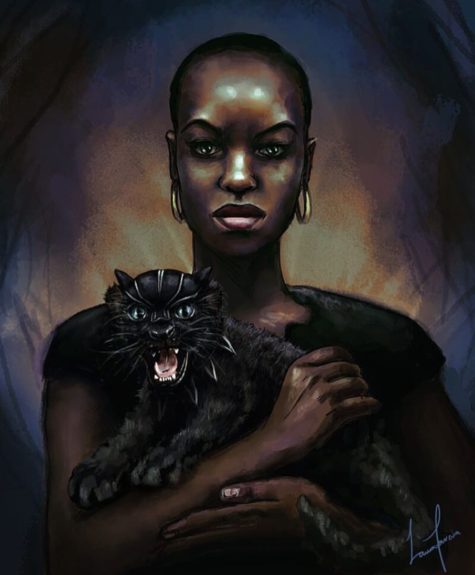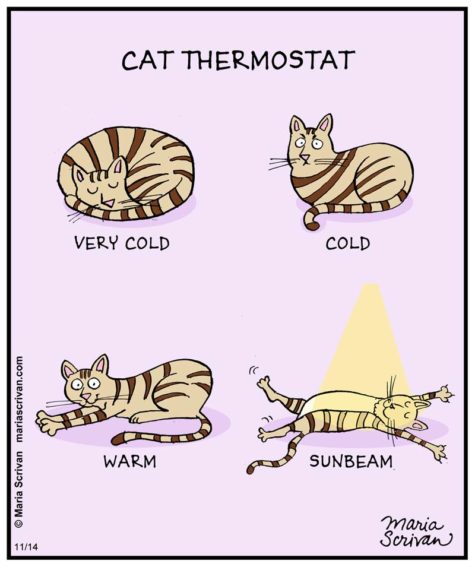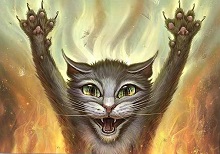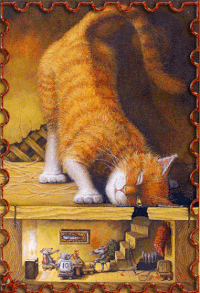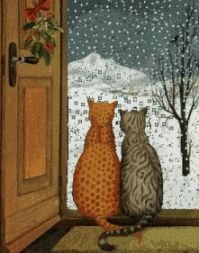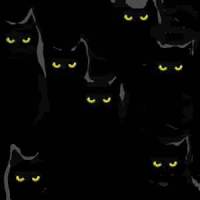Feline Folklore
Mau Comes Into Being
There was a day when darkness gathered itself into a hungry snake and crawled upon the earth. On her belly she crept toward the city of light, swallowing whatever lay in her path: Men and women, beasts, vegetables and Gods. And no thing that touched her lips escaped her, for all matter was lost in the darkness.
That was the day, or rather the night, that Ra left the sky and took his shape in the cat. To fool the snake, he slept under the leathery leaves of the laurel, holding in his strength, stirring only once for a single languid lick of his paws to brush against his whiskers.
Seeing the cat ~ that tasty bit of flesh, the snake slithered over and opened its mouth. On the other side of her teeth swelled the void, the abyss, the great nothing, and from it issued the cries of all the lost things of creation. Their voices were a wailing wind that beckoned from the darkness.
Then the soul of Ra in the form of a tiny cat leapt up beneath the shade of the laurel and, with teeth of iron and gold, he snapped off the head of the snake and sliced its body into a thousand pieces and swallowed them up.
Blood from the snake’s mouth spilled onto the ground. In that manner Ra’s creations returned to earth. The blood seeped into the ground and was taken up by the thirsty laurel, which burst into bloom with the souls of the dead in the shape of yellow flowers.
Now leaning down from the east edge of heaven, the God of words had witnessed the battle. He had felt each puncture of the snake’s teeth upon his own throat and praised the cat which had given its shape to Ra.
“How like the God that made him is the radiant cat. How he slew the darkness with his mouth!” And Mau became the cat’s name and the God gave him words of power.
~From Awakening Osiris
32 Superstitions About Cats
- When you see a one-eyed cat, spit on your thumb, stamp it in the palm of your hand, and make a wish. The wish will come true.
- A kitten born in May is a witches cat.
- A black cat seen from behind – a bad omen
- A black cat crossing your path – good luck.
- A black cat crossing one’s path by moonlight means death in an epidemic. (Irish superstition)
- A strange black cat on your porch brings prosperity. (Scottish superstition)
- English schoolchildren believe seeing a white cat on the way to school is sure to bring trouble. To avert bad luck, they must either spit, or turn around completely and make the sign of the cross.
- In the USA, Spain and Belgium a white cat crossing your path was considered to be good luck.
- To see a white cat on the road is lucky.
- It is bad luck to see a white cat at night.
- Dreaming of white cat means good luck.
- Stray tortoise shell cat – bad omen
- In Normandy, seeing a tortoiseshell foretells death by accident.
- Cats bought with money will never be good mousers
- It is bad luck to cross a stream carrying a cat. (French superstition)
- Cat sneezing once means rain
- Cat sneezing three times – the family will catch a cold
- A cat sneezing is a good omen for everyone who hears it. (Italian superstition)
- In the early 16th century, a visitor to an English home would always kiss the family cat.
- A cat washing on the doorstep means the clergy will visit
- If a cat washes behind its ears, it will rain. (English superstition).
- When the pupil of a cat’s eye broadens, there will be rain. (Welsh superstition)
- A cat sleeping with all four paws tucked under means cold weather ahead. (English superstition)
- In the Netherlands, cats were not allowed in rooms where private family discussions were going on. The Dutch believed that cats would definitely spread gossips around the town.
- If cats desert a house, illness will always reign there. (English superstition)
- In 16th century Italy, it was believed that if a black cat lay on the bed of a sick man, he would die. But there’s also a belief that a cat will not remain in the house where someone is about to die. Therefore, if the family cat refuses to stay indoors, it was an omen of death in the family.
- When moving to a new home, always put the cat through the window instead of the door, so that it will not leave.
- A cat on top of a tombstone meant certainly that the soul of the departed buried was possessed by the devil.
- Two cats seen fighting near a dying person, or on the grave shortly after a funeral, are really the Devil and an Angel fighting for possession of that person’s soul.
- If you kick a cat you will get Rheumatism.
- To kill a cat brings seventeen years of bad luck. (Irish superstition)
- Killing a cat is an absolute guarantee that you have sacrificed your soul to the Devil.
Found at: Sigils Symbols and Signs
Cats and Baby’s Breath
Long, long ago in parts of Europe, it was believed that fairy folk stole babies from their cribs and left in their place a fairy child. They were called changelings and were unhappy in the human world. A fairy child grew up wild and fey, always looking for a way back into the Summerlands; its green or blue eyes were slanted a little and its ears were a little more pointed than normal. And a changeling had a strange way of looking at the world, as though looking through the world to something hidden beyond.
But how? I hear you ask. How could fairies steal away babies?
Long ago, when fairies walked invisible in the world, only cats could see the fey folk. When a cat sat silently watching and there was nothing there to see, it was watching the fairies about their business. And when a cat sat on a mother’s lap, the sound of the cat’s purring was the sound of it spinning sleep so that the fairies could steal away her child to be their toy.
The purr was like the sound of spinning wheels steadily spinning and that’s what it was – as humans slept in an enchanted sleep spun by a purring cat, the fairies stole away the human infant and left one of their own in its place.
It was in the cat’s nature to be attracted to a changeling infant and to suck its breath as payment for spinning sleep. So at night, the cat settled down in the changeling’s crib and sucked the changeling baby’s warm milky breath. Sometimes a greedy cat stole too much of the baby’s breath and the parents grieved over the child, not realizing that their own baby had been stolen away long time before.
The ancient compact between cats and fairies ended long time ago when the wise cats realized that humans offered a far more comfortable home. Cats still sit and watch fairies about their invisible business, but they no longer spin sleep so that fairies can steal away human children to be their toys. Cats still like the warmth of a baby’s crib and are still accused of stealing a baby’s breath.
And of course, cats still purr like steady spinning wheels. When a cat is contented it purrs to itself in satisfaction, knowing that it has a far better compact with human folk than with fairy folk. In modern times, a cat only spins sleep if you let it.
From: Moggy Cat
The Witch-Cat of the Ozarks
A drunken braggart accepted a dare to sleep in a house that had once been used by witches. At midnight, when he had finished his jug of whisky and was just beginning to fall asleep, an enormous cat suddenly appeared.
It howled and spat at him, so he shot at it with his hunting gun and, though it escaped, he was certain he had shot one of its paws clean off. At that moment a woman’s scream was heard in the distance, and just as the candle went out, the man saw a woman’s bare and bloody foot wriggling around on the table.
The following day he learned that a woman who lived nearby had accidentally shot her foot off and had died from loss of blood. It is said that she died howling and spitting like a cat.
Found at: Moggycats Cat Pages
The Cat and The Rat
The cat has always and everywhere been the rat’s enemy, and according to Madagascan legend it was the rat who started it.
Once upon a time the cat and the rat lived in peace. One day, however, a great famine overtook them. There was nothing to eat, so they set off for a more fertile country. On the journey they came to the banks of a river too wide for them to swim across. Finding no driftwood to use as a raft, they dug up an enormous yam. The rat set to and hollowed it out with his teeth, making a canoe.
When the boat was ready they embarked, the cat paddling and the rat navigating from the stern. But the rat, having been born with an eternal hunger, soon began to eat the edges of the yam. The cat knew nothing of this until the canoe shipped water and began to sink. Then, too late, he realized that the rat had foolishly put both their lives in danger. He meditated on revenge. In the water the rat, weak with hunger and fatigue and about to drown, begged the cat for help.
“I will only help you,” said the cat, “if you agree to let me eat you when we reach land.”
Always having a trick in reserve, the cunning rat consented. When they reached the bank the rat said to the cat, “Wait till I am dry. While I am saturated you will not find me good to eat.” The cat believed him, and the rat used the delay to dig out a hole among some tree roots and hide. “Now I am dry,” he cried.
In vain the cat struggled, digging furiously, but the rat was safely out of reach deep in the earth. And so it was that the rat escaped and that the entire race of cats, duped, declared eternal war on the entire race of rats.
Found at: Moggycats Cat Pages
The Sacred Cat of Burma
The sacred cat of Burma is not, as some might suppose, the Burmese, but is a breed known in the west as the Birman. A charming legend accompanies the Birman cat.
Many years ago, in a temple built on the side of the mountain of Lugh, there lived in prayer the very venerable Kittah Mun Ha, the great Lama precious amongst the precious, whose golden beard had been plaited by the god Song Hio himself. There was not one minute, not one look, not one thought of his existence that was not consecrated to the adoration, the contemplation, the pious service of Tsun Kyankze, the goddess with the eyes of sapphire. She presided over the transmigration of souls, which allows a Kittah to relive the span of his animal existence in the body of a sacred animal before he takes up a body haloed in the total perfection and holiness of the great priests.
Sitting in meditation beside Mun Ha was Sinh, his beloved oracle, a cat quite white with eyes of yellow, a yellow that reflected the golden beard of his master and the golden body of the goddess whose eyes were the color of the sky . . . Sinh, the counselor, whose ears, tail, nose and paws were the color of soil, a sign of the taint and impurity in everything that touches or can touch the earth.
Now, one evening, while a malevolent moon was permitting the enemy from Siam to approach the sacred place, the great priest Mun Ha entered softly into the state of death, with his divine cat at his side and under the despairing eyes of his overwhelmed Kittahs. it was then that the miracle took place . . . the unique miracle of the immediate transmigration.
With one bound, Sinh was on the golden throne, perched on the head of his departed master. He arched himself up on this head which, for the first time, no longer contemplated the goddess. And Sinh also became spellbound before the eternal statue, and the bristling hairs on his white spine suddenly become the yellow of gold. And his golden eyes became blue, huge and profound like the eyes of the goddess.
And as he turned his head gently towards the South door, his four paws, touching the venerable skull, became a blinding white. And as his eyes stared at the Southern door, the Kittahs obeyed the expression in the eyes that were charged with hardness and with light. They threw themselves against the heavy bronze doors and against the first of the invaders.
The temple was saved from profanation and pillage. Sinh, however, had not left the throne. He did not move for seven days, but on the seventh day, steadily facing the goddess and with his eyes on her eyes, he died, hieratic and mysterious, carrying towards Tsun Kiankze the soul of Mun Ha, from then on too perfect for this earth. And when, seven days later, the priests gathered before the statue to consult among themselves on the succession to Mun Ha, all the cats of the temple came running – and all were clothed in gold and gloved in white, and the yellow of all those eyes had been changed to a deep sapphire blue. In silence they all surrounded the youngest of the Kittahs, who was designated in this way by the will of the goddess.
‘From that day, if a sacred cat should die in the temple of Lao-Tsun, it is the soul of a Kittah that takes its place for ever in the paradise of Song Hio, and the golden god.
Found at: Moggycats Cat Pages
How Cats Came To Live With The Hopi
A long time ago a Hopi boy went out to hunt. It was winter and the snow lay on the ground in the valley where he searched for game. To his surprise he found some tracks in it that were like no tracks he had ever seen before, and he followed them. The tracks led out of the valley and ended at a large rock.
The boy put his hand into the opening under the rock and pulled out a strange animal by its leg. He tied its legs together and started back with it to his village. When he reached home, he asked his father what the animal was. The boy’s father replied that it was a cat and that it ate mice, rats and rabbits.
On hearing this, the boy went back into the valley and caught a rabbit which he brought back to the cat. He kept the cat confined in a niche in the wall of his home and continued to feed it for four days. In this way the cat became tame and cats have lived in Hopi houses ever since.
Found at: Moggycats Cat Pages
The Four Eyed Cat
It was once generally believed by British fishermen that it is unlucky to take a woman to the fishing grounds, allow a woman onto a fishing boat or even to meet a woman on the way to sea. In some places this taboo extends even to mentioning a woman. This superstition persists in a few areas.
Once there was a gentleman had a beautiful daughter who was bad at heart. It was said that she knew more than a Christian ought and the people thereabouts wanted to swim her. This meant they wanted to test her as a suspected witch by casting her into the water to see if she floated – if she floated it was proof she was a witch, if she sank then she was innocent.
However, no one dared swim the suspected witch because of her father. The girl put a spell on a poor fisherman, and he became so in love with her that he followed her wherever she went. Even though he was engaged to be married that week, he deserted his bride-to-be and ran away to see with the gentleman’s daughter. She did this to spite her proud father, but her father thought himself well rid of the spiteful maid.
The fishermen unwittingly took her out with them to the fishing grounds; the only one that knew she was in a fishing boat was her lover who had hidden there. A great storm blew up and the whole fishing fleet were lost and every man drowned. It was said that she had whistled up the storm. She had even drowned her own lover out of spitefulness. Afterwards, she turned into a four-eyed cat and she continued to haunt the fishing fleet. This is why fishermen will never cast their nets before cock-crow (half-past three) and why they always throw a bit back into the sea to appease the cat.
Found at: Moggycats Cat Pages
African Cat Gods and Lore
Africa has cats. We all know that. The problem is that most of the cats of Africa can rip you to shreds without so much as an “if-you-please.” Sure, Egypt and their adored cats were in Africa, but that culture was radically different from those of the remarkably diverse peoples inhabiting the rest of this vast continent.
Big and dangerous cats were everywhere, and I would think that dealing with them would be precarious at best. For instance, imagine how scratched up you can get when performing the marginally difficult task of giving your cat a bath. Now imagine if that cat weighed about 400 pounds like the African Lion. And lions aren’t the only big African cats; don’t forget cheetahs and leopards.
Fortunately, these magnificent creatures usually won’t harm humans unless they are starving or terrified. The indigenous people of Africa have nothing but the respect for these big-cats (and indeed all animals) and their ancient myths and legends are filled with the exploits of these creatures.
But there was one African cat that wasn’t so big. To the Africans it was just another cat, albeit, a smaller one. We’ve given it the scientific name Felis Libyca or simply the African wildcat. Around 4497 years ago (c.3000 B.C. ) this wildcat made its way through Ethiopia and up into Egypt. These are believed to be the very cats that the Egyptians domesticated.
While we’re on the subject, the cat we all know and love today is descended from the pairing of the African wildcat Felis Libyca and the European wildcat Felis Silvestris, (do you suppose this where the cartoon Sylvester got his name?) And just in case you are burning with curiosity, that adorable pussycat all snuggled nicely in your lap is designated Felis Catus.
So next time you happen to be studying the behavior of your cat, remember its rich African heritage. And if you are looking for an interesting and unusual magickal name for your cat, you might consider the following:
- AGASSOU (Ah-Gahs’-Oo) Panther Fetish of the Dahomey tribes. Male or Female:
Dahomey (now called Benin), is a country along the West Central coast of Africa, founded by the Yoruba tribe of Ife in the 12th century. Over time this region was settled by people known as the Edo and the Fon. Within this rather small district, four kingdoms arose, the mightiest of which was Abomey. Dahomey was well known for its fine craftsmanship, being particularly adept in ivory sculpture. A walled city said to be 25 miles in circumference, Dahomey was one of the magnificent jewels of African civilization. Now Agassou wasn’t a god but a fetish, which means an object empowered by spiritual forces. Since the Panther was considered a creature of great power and courage, the figure of Agassou the Panther was assigned as guardian and protector to the king (called the Oba.)
- AKONGO (Ah-Kong’-Go) Male:
There are those cats which enjoy the company of humans and then there are those that do not. If your cat is one of the kind that despises the formalities of social interaction, then listen to this tale from the Ngombe tribe of the Congo. Akongo was the Supreme god.
Being a benevolent, easy going deity he chose to live upon the earth with humanity because he enjoyed working and relaxing alongside them. But things began to grow sour. The humans began complaining and bickering about the most trivial of things. They became more and more self-centered, selfish, greedy and covetous. Where they once enjoyed idyllic pleasures during their time of leisure, they now filled those moments with drunken revelry and obnoxious behavior. Then one day, two of the humans attacked each other.
A violent battle ensued which so disgusted the god Akongo that he left humanity to themselves. He was said to have disappeared into the depths of the jungle, determined to never again associate with people. It is said that he has not been seen since. So if you know of a cat like this, antisocial and preferring solitude, remember the name Akongo.
- AMMA (Ah’-Mah) Male:
This is the Supreme god of the Dogon tribe of Mali. He was something of a misogynist actually, so here’s a name for a neutered cat that really couldn’t care less about females. Why was Amma such a misogynist? Well, being the supreme god, naturally he created the world and the universe. They say he created the stars by tossing dirt clods into the sky.
Next, he decided that he would create a woman so he could breed. He made this woman, also from clay. She was the earth. But one thing bothered Amma. Upon the surface of the newly formed earth grew a termite mound. This was in fact her clitoris. Fearing that this might prove to be a sign of a competing masculinity, the god had it severed, believing that in doing so he would make her 100% woman.
An awful story, I know, but to this day some African peoples still practice a form of female circumcision called clitoridectomy. Whether or not this has anything to do with the myth is uncertain.
- ANANSI (Ah-Nahn’-See) Male:
To the Ashanti culture he is one of the most important heroes and is the primary character in many of their myths. Even though you may not have heard of this god, there is one tale about him with which I’m sure you’re familiar.
It’s a rather long, complicated story, but the gist of it is Anansi must gather several items for the sky god Nyankopon. This he does in his prank-laden style. The last item he had to collect was a nature spirit, most elusive elementals indeed. Of course Anansi had a plan. He molded a figure of a person out of an extremely sticky resin and placed it on a rock where he knew the nature spirits often passed. Near the figure he placed a dish of food.
Before long, one of these nature elementals came by and noticed the food. The spirit asked if it could have a taste, but naturally the figure did not reply. Thinking the “person” was being disrespectful and rude, the elemental slugged the figure as hard as he could. Much to his surprise, his hand became caught in the resin. Panicking, the spirit hit the figure with his free hand and then kicked it and finally butted it with its head. With each movement the spirit became more and more stuck in the gooey tree sap until he was absolutely unable to move.
At this point Anansi approached the hopelessly trapped elemental and placed him in a sack to make his delivery. If you haven’t recognized the story by now, then you’ve never heard any of the American folk tales attributed to a fictional slave named “Uncle Remus.” This African legend is in fact the source for the story of Brer Rabbit and the tar baby. Since many cats are known for their mischievous antics and behavior that might even be construed as deliberate pranks, keep the name Anansi in mind.
- BUMBA (Boom’-Bah) Male:
Cats will at sometime in their lives throw up hair balls. No big deal, it’s just a fact of feline existence. If your cat seems to be hacking them up continuously, then this god name with its odd little tale might be appropriate.
Bumba is another one of those creator gods, this time of the Bushongo people of the Congo. How this god created the world is disgusting to say the least since he vomited up the stars, the sun, the moon, everything in fact. He then created (or vomited) Heaven and Earth who were supposed to live together as a married couple. Things didn’t work out and Heaven decided to leave for good. They have been divided ever since. Reunification is only possible when the material Earth ceases, which actually means when WE cease.
- FAMIEN (Fah’-Meen) Male:
Cats are often associated with witches and wizards and such. Some say that the reason for this is due to their unique ability to absorb evil influences and repel negative energies. Perhaps you’ve discovered this feline trait yourself through observing the protective behavior of your own cat.
If so, then Famien might be just the name for your guardian mouser. Famien was the fertility god of Guinea, but besides that he was also the preeminent luminary against demons and dark sorcerers. If that wasn’t enough, he was also the supreme lord of good health. A name that resonates with favorable luck.
- GUNAB (Goo’-Nab) Male:
For some reason this god of the Hottentot was considered an evil force, even though he is said to have created the rainbow. He was known to make dark rock quarries his domicile, so maybe if your cat likes dark hiding places this would make a suitable name.
- GURUHI (Goo-Roo’-Hee) Male:
Here’s an appropriate name for a spoiled and moody cat, prone to insisting upon selfish demands. Guruhi is another evil god, this time from Gambia. He was a most demanding and vengeful god. However, to his worshipers he bestowed great powers, providing they offered him the right kind of blood sacrifice, that is. Those uninitiated to his cult were forbidden even to gaze upon him, and Guruhi took great delight in torturing those foolish enough to ignore this rule.
- HEVIOSSO (Heh-Vee-Oh’-So) Male:
There are some cats that are content to simply relax in the window sill enjoying the sunshine. Then there are the cats that have to tear apart everything in sight, sparing neither couch nor curtain from their razor sharp claws. If this sounds familiar to you, you may consider naming your destructive kitty after the Dahomey god of thunder, Heviosso.
Besides the usual chaotic attributes which you would expect to accompany a thunder god, there is a very curious ritual performed in his honor by troupes of ceremonial dancers that explains why this name fits a ruinous kitty so well.
During his rites, the dancers of Heviosso make thunder-noises while engaging in wild movements representing the thunder god’s sexual union with the earth. These dancers froth themselves up into such turmoil that they begin wrecking everything and anything including their own homes. They tear apart bushes and vegetation. They assault innocent spectators. They’ve even been known to raze the various sacred sites to the ground. And just think, all this could be avoided if only they had a really big scratching post.
- KALUMBA (Kah-Loom’-Bah) Male:
Kalumba was the god of creation to the Luba tribe of Zaire. Cat fanciers can appreciate one story concerning this god, if only because it makes dogs look so stupid. As the tale goes, Kalumba noticed the forces of Life and Death, casually strolling down a dirt path toward the world of the creatures called men whom he had only recently created. To insure that his creations would be allowed to flourish, Kalumba posted Dog and Goat in the middle of the road with orders to let Life pass while apprehending Death.
Once Goat and Dog were in place, they started bickering about which one of them would do the best job by staying awake the longest. Goat left Dog alone, just out of spite. So, all alone, Dog did his best to keep a vigilant watch, but to no avail. Dog fell sound asleep and while deep in slumber, Death walked right on by and entered the world of man.
Well, the next day Goat returned to relieve Dog who quickly departed in shame. Determined not to be as foolish as Dog, Goat forced himself to stay wide awake. Eventually he spotted Life coming on down the road and promptly detained him. Thus it was that Life was prevented from passing to the world of men, giving Death free reign. Of course things would have been a lot different had Kalumba posted cats on that road. Especially if they were BIG cats.
- KOKOLA (Koh-Koh-Lah’) Male:
This god was supposed to keep watch over precious items and valued possessions. Legends say that he lived in a cave near the banks of Lake Victoria. It was to this cave that various articles in need of protection were brought, kind of like a rock-hewn safety deposit vault.
Now I’m sure we all know of a cat that is a bit overprotective of one thing or another. It could be a particular food-dish, a treasured catnip toy, or even a favorite place to sit. By exhibiting such behavior, the cat may very well be imitating some trace remnant of Kokola’s guardian tendencies.
- KYALA (Kye-Ah’-Lah) Male:
This is the creator god to the Nyakyusa tribe of Tanzania. He started off as a simple provincial god then made his way up to the king-sky god. He became so vainglorious as a result of his rise to power that he demanded an instant cessation in devotions from those who worshipped him. He decided that he was just too significant to be dealing with trivial little creatures like humans. Got a stuck-up feline who thinks his litter box doesn’t stink? Then here’s the consummate name.
- LEGBA (Leg’-Bah) Male:
Keep in mind, Legba is considered an evil god by the Dahomey. You may recognize his name if you are familiar with the practice of voudon or voodoo, for this African god was the original form which was later adopted by the Haitians. Evil god that he was, the Africans still paid him homage by offering preventative sacrifices more or less as a means of keeping him away. These sacrifices were often small goats, usually offered during the rites to HEVIOSSO.
Legba was also represented by small clay figurines which every tribe member kept near their home. These figures were tended to regularly by offering food and often a sacrificed chicken in an effort to satiate the dark god. I only include this name because, after all, not everyone’s cat is a saint.
- LISA (Lee’-Sah) Female:
Finally, a female name for a change. Lisa (also known as Leza or Lissa) is the chameleon god of the Dahomey. She is often associated with the chief god MAWU. Together with their son Ge (god of the moon), they form one of the many triads found in mythologies the world over. Actually, Lisa could be either a god or a goddess–something of a divine androgen. In her female state she is considered goddess of chameleons because it is told that she sent these creatures as helpmates to those humans engaged in expanding her sect.
With that in mind, I can think of two situations where one might name their cat after this chameleon goddess. First, since calico cats are a virtual potpourri of colors, the chameleon motif works nicely. Then there are those cats with fluctuating behavioral patterns that range from moody to content to wild back to moody again.
If you pay close attention, you might find that your cat is merely reflecting your own state of mind. If so, then this goddess’s common sounding name would truly fit the chameleon-like traits of your uncommon cat.
- MAWU (Mah’-Woo) Male:
We’ve already touched on Mawu and his relationship with the androgynous LISA, but it should be pointed out that he has a bit of an androgynous nature himself. To some of the Dahomey tribes Mawu remains the chief of the gods, but some tribes in West Africa consider Mawu to be the goddess of the moon. Then too, the Dahomey tribes often unify Mawu and Lisa into a male/female god named, oddly enough, Mawu-Lisa, the progenitor of all Dahomey gods.
Regardless, he is most often thought of as the creator. With Lisa and their son Ge, they form an important triad not unlike that of Egypt’s ISIS, OSIRIS, and HORUS. All this can be confusing enough as it is, so let’s leave out the part where Mawu (the moon goddess version) gives birth to a male form of Lisa (now considered a sun god) to form a unified King of the Gods. Here’s a good name for a sexually ambivalent cat, male or female. Besides, don’t you think Mawu sounds kind of like “meow”?
- MULUKU (Muh-Loo’-Koo) Male:
Another Supreme god, this time from Zambesi. The story goes that after making the earth, Muluku decided to dig two holes deep into the newly created soil. Soon a human male crawled out of one hole, while out of the other hole climbed a human female.
Right away, Muluku set to organizing these new creatures by providing them with tools and seeds with which they might begin to cultivate the land. He gave them instructions on using the tools and on the various seeds to plant. He showed them how they might build shelter and how they were to prepare the harvests which the seeds would soon yield.
Unfortunately none of this seemed to mean much to the new humans. They ate the seeds raw, tossed the tools all about making a big mess and then headed off toward the forest where they both hid in the trees. Needless to say, this irked the god to no end. As an experiment Muluku called two monkeys, a male and a female, and just for kicks gave them identical tools, seeds and instructions.
Well, the monkeys wasted no time. They planted, they worked, they built their shelters, and in time they harvested the food and even used a few of the recipes that Muluku had so thoughtfully suggested. Learning what he had set out to discover, the god knew just what his next move would be. Cutting off the tails of his two monkey friends, Muluku quickly attached them to the two foolish humans still hiding in the trees.
So it was that the original humans became monkeys and the original monkeys became humans. There is a very important message in this whimsical legend, though I have no idea what it is. Since Muluku was both a creator god and a harvest god, this name might suit a country-cat, at home in the corn and the wheat. If not, well then you’re on your own with this one.
- MUNGO (Muhn’-Goh) Male:
Here is a name that recalls the cat “Mungojerry” of T.S. Eliot fame. Actually, Mungo was the rain god of the Giryama of Kenya. To get him to send rain, what you do is sacrifice a goat along with a chicken, beat on the horn of a water buffalo while asking Mungo to send precipitation, then tie a white sheet to the roof of your house. As if through a miracle, it will begin raining! Well, eventually anyhow. Name your cat Mungo if he happens to love staring out the window on dark and drizzly days.
- NAMPA (Nahm’-Pah) Male:
Does your cat have a problem with hairballs? What cat doesn’t? Of course some cats have more of a problem than others, so if your kitty happens to be one of those chronic hairball types, Nampa may be just the name for you.
Nampa was more of a spirit than a god. To the people of Senegal he is represented as a fetish composed of pulped roots and leaves which are then, you guessed it, rolled into little balls. That’s about all the information I could get on him since only the elite get to worship him and that they do in utmost secrecy.
- NYAMBE (Nigh-Ahm’-Bee) Male:
There are actually two gods with this same name or a variation of it (Nyambi.) One is the Nyambe of the Koko tribe in Nigeria. To the Koko, he was the god of regeneration. He lived on the earth with humans and provided them with immortality through the agency of one very special, life-giving tree. But the people began to take this beneficent god for granted. This hurt Nyambe very much.
One day he called the people to gather around. When they had assembled, the god took a bundle of twigs and asked if any man was strong enough to break them. Many tried that day, but no one succeeded. Nyambe then pointed out that when the twigs were released from the bundle, they broke quite easily. He explained that when they had bound themselves to him, they had strength and nothing could take that from them, but now that they distanced themselves from him, they were alone and weak. With that, Nyambe pulled the tree of immortality from the ground and disappeared forever. It wasn’t long after this that people began to die.
The other Nyambe hails from the Barotse tribe of Upper Zambesi. His tale is interesting in that it is one of many African legends which, from tribe to tribe, speak of man’s foolishness in attempting to reach god by constructing a tower to the heavens. Sound familiar?
Anyway, this legend reads more like an old Warner Brother’s cartoon, with Nyambe being chased around the globe by a whining human named Kamonu. Kamonu was full of petty requests which the god always fulfilled. Then one day, the god had reached his limit. Unfortunately, that was the day that Kamonu’s child died.
For the first time the god’s help was needed for something really important, so Kamonu tracked Nyambe down and begged his assistance. But the god wouldn’t listen and ran away into the forest. No sooner had Nyambe settled down in the forest than he noticed Kamonu only a few steps away. The god ran off to a secluded cave, where, who should be waiting for him but Kamonu. Nyambe, stunned by the sight, ran to the top of the world’s highest mountain only to find Kamonu there already. Eventually Nyambe was able to get completely away.
Undaunted, the indefatigable Kamonu built himself a tower just as high as he possibly could. It is said that Kamonu sits upon his tower to this very day, greeting the sun and the moon as they make their passage across the sky, and that he shall continue to sit there for all eternity, hoping one day he will be allowed to see Nyambe again. In both stories you’ll notice the god’s desire to shun human society, so consider that should you be trying to think of the right name for an adopted feral cat.
- NZAMBI (Nah-Zahm’-Bee) Female:
Another female! Nzambi was the great goddess of creation to the Bakongo tribe of the Congo. She was said to have walked the world of men disguised as a filthy old beggar woman, pleading for help wherever she went. To those who assisted her she gave great rewards. However, those who offered her nothing but scorn were severely punished and learned a very hard lesson about charity. This is only one example of her style. She was known for bestowing grace or scrutiny to individuals based upon their virtues or faults, respectively. A fitting name for one of those slovenly street cats that turn out to be much more than they might have at first appeared.
- OGUN (Oh’-Guhn) Male:
The West African tribes of the Nago and Yoruba recognize Ogun as the god of iron and warfare. Since he is the god of iron, he is the patron of forgemen and metalworkers. It makes sense then that he is also the god of war when you consider the weaponry crafted by these artisans. As for Ogun himself, his weapon of choice is the machete.
This god and his machete have become symbols of clearing away difficulties, and to this end they are often evoked. This is the result of a story wherein the legendary gods first come to the earth, only to find the entire planet covered with dense thorn bushes and other barriers of wild vegetation. Rising to the occasion, Ogun used his machete to cut a pathway for his fellow deities.
Since then he has been called upon to lend his helping hand by those seeking assistance in achieving their goals. Perhaps this is also how he got his reputation as a war god. As a cat name Ogun might be good for a fighting tom, but on a more civilized note you might give this name to an emotionally beneficial cat.
- OMUMBO-ROMBONGA (Oh-Muhm’-Boh Rohm-Bong’-Gah) Male or Female:
This name doesn’t belong to a god, a devil, or even a spirit. This is the name of the tree from which all human beings were born, according to the Herero Bushmen of South West Africa. It is also the source from which many other animals originated. Because of this, it is believed that humans and animals once spoke a common language having been born from the same tree. Sadly, this language has been long forgotten by human beings. Omumbo-Rombonga is a lot easier to pronounce than it may look and makes a great name for tree-loving cats of either sex.
- RUWA (Roo’-Wah) Male:
Sometimes myths from vastly diverse cultures share common details and motifs as in the following story from the Djaga tribe of Kilimanjaro. Ruwa was the supreme god, though he had more to do with the management of creation than with actually creating it.
He had recently freed the humans from that big pot where they had been kept prisoner and now he was preparing a garden where they could live in peace. He filled this garden with all sorts of fruit bearing trees, and in the middle he placed a sacred yam which was forbidden to the humans.
Everything went just fine for a long time, but then one day an odd looking beggar came to the garden in search of food. He was offered as much of the garden’s fruits as he wished, but he claimed to have met Ruwa on the way to the garden and said that the god had told him it was time to eat the sacred yam. Without a moment’s hesitation the people pulled that yam from the middle of the garden and began to cook it with great celebration.
Soon the scent of the yam filled the air, and it wasn’t long before the smell reached heaven. Catching a slight whiff of the forbidden yam, Ruwa dashed down to the garden. There he saw the humans whooping it up, doing exactly what he had told them not to do. The god was understandably upset, especially since the word of a stranger had been followed rather than his own explicit orders.
Taking what was left of his sacred yam, Ruwa went back to heaven leaving the humans with a new susceptibility to something called death. Nothing particularly cat-like seems to be in this interesting tale, but has that ever stopped us before from finding some half-baked reason to use a name for your cat? Of course not! Use this name for an arbitrarily demanding feline with very little sense of humor.
- SHANGO (Shahn’-Goh) Male:
To the Yoruba of West Africa, Shango is the god of storms, thunder, and lightning. He carries a thunderbolt which is often symbolically rendered as an ax. In this regard he is very close to the Nordic god Thor. A good name for an extremely sharp, lightning fast cat with a volatile personality.
- WAKA (Wah’-Kah) Male:
Another rain god. But to the Galla of Ethiopia, Waka is much more than a rain god. He is also the god of rituals and ceremony. Keep this name in mind if your cat is of an ordered, mystic nature.
- WULBARI (Wool-Bahr’-Ee) Male:
Supreme god of the Krachi from West Africa. There is an odd story concerning this eccentric deity and the trickster god ANANSI. Among the animals invited to dwell in the heavenly court was Anansi, the tricky spider god. Being something of a braggart, Anansi started getting on Wulbari’s nerves. He boasted that he was much more clever than the supreme god.
To Wulbari, this just wouldn’t do. One evening the mighty god summoned the various animals to witness the presentation of a challenge to Anansi. If the trickster god could simply leave heaven for awhile and return with “something” then Wulbari would concede that the trickster god was indeed far more clever than he. There was a catch however. Wulbari wouldn’t say what the “something” was.
Accepting the challenge, Anansi left the court and promptly constructed himself a bird-suit disguise from various feathers he collected. Wulbari himself, so certain that Anansi was far away by now, blurted out that the “something” he was thinking of was the Sun, the Moon and total darkness.
Anansi, hearing this while disguised as a bird ,now knew exactly what the “something” was. Anansi came back with a sack and upon its opening, out escaped total darkness. Unable to see a thing, the other creatures fumbled about in complete chaos. Then the trickster god opened the sack again and released the Moon. That was slightly better. At least now there was a dim light in the sky. But then without warning, Anansi pulled out the brilliant Sun. This stunned everyone since their eyes had adjusted to the soft light of the Moon.
Many of the animals present were blinded by this surprise, and Wulbari was forced to admit that the trickster god had won the challenge. This tale is supposed to explain how blindness came into the world, so if you are the unfortunate owner of a blind cat (it does happen you know), then I guess this name might be appropriate. But since we all know how well cats maneuver in darkness, I think you can name any cat Wulbari in commemoration of this unusual incident.
Found at: Lowchen’s Australia
